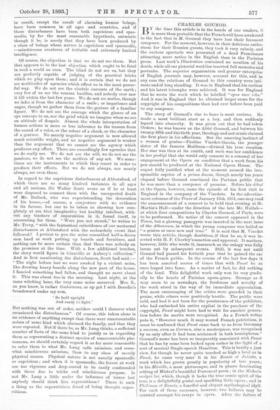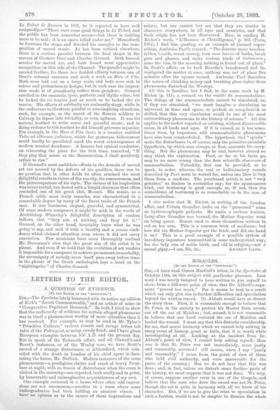CHARLES GOUNOD.
BY the time this article is in the hands of our readers, it is more than probable that the French will have awakened to the fact that in M. Gounod they have lost their foremost composer. For the moment, however, in their delirious enthu- siasm for their Russian guests, they took it very calmly, and the curious spectacle was presented of a dead Frenchman attracting more notice in the English than in the Parisian press. Last week's illustration contained no mention of his death, while all our pictorial weeklies inserted full memoirs and portraits. The superior organisation and greater enterprise of English journals may, however, account for this, and in any case the relations of Gounod to this country were inti- mate and of long standing. It was in England that his earliest and his latest triumphs were achieved. It was for England that he wrote the work which he labelled "opus mew vitae." And it was in England that he obtained larger sums for the copyright of his compositions than had ever before been paid to any composer.
The story of Gounod's rise to fame is most curious. He made a most brilliant start as a boy, and then suddenly lapsed into obscurity. It was given out that he had taken Orders; he was known as the Abbe Gounod, and between his twenty-fifth and thirtieth year, theology and not music claimed the first place in his affections. But the unerring instinct of a woman of genius—Pauline Viardot-Garcia, the younger sister of the famous Malibran—divined his true vocation. Her star was then at its zenith, and such was her confidence in her protégé that she would only consent to a renewal of her engagement at the Opera on condition that a work from his pen should be produced at the National Opera House. The sequel fully justified what at the moment seemed the irre- sponsible caprice of a prima donna, though nearly ten years elapsed before Gounod convinced the Parisian public that he was more than a composer of promise. Before his debut at the Opera, however, came the episode of his first visit to England in the company of the Viardots. In the advertise- ment columns of the Times of January 13th, 1851, one may read the announcement of a concert to be held that evening at St. Martin's Hall—under the direction of the late Mr. Hullah- at which four compositions by Charles Gounod, of Paris, were to be performed. No notice of the concert appeared in the Times, but a glowing panegyric was inserted in the next issue of the Atheneum, in which the young composer was hailed as "a genius at once new and true." It is said that M. Viardot wrote this article, though doubtless, if that be so, it was in- serted with H. F. Chorley's sanction and approval. It matters, however, little who wrote it, inasmuch as the eulogy was fully borne out by subsequent events. Still, it was not until Gounod bad passed his fortieth year that he gained the ear of the French public. In the course of the last few days it has been asserted scores of times that with Faust be at once leaped into fame. As a matter of fact, he aid nothing of the kind. This delightful work only won its way gradu- ally to the hearts of Parisian opera-goers. Strange as it may seem to us nowadays, the freshness and novelty of the work stood in the way of its immediate appreciation. The most encouraging of the critics were guarded in their praise, while others were positively hostile. The public were cold, and had it not been for the persistence of the publisher, who had embarked his entire capital in the purchase of the copyright, Faust might have had to wait for another genera- tion before its merits were recognised. As a French writer puts it, "However much it may wound French patriotism, it must be confessed that Faust came back to us from Germany a success, even as Carmen, also a masterpiece, was recognised by us only after it had been acclaimed in both hemispheres." Gounod's name has been so inseparably associated with Faust that be has by some been looked upon rather in the light of a sort of musical Single-speech Hamilton. This is hardly a just view, for though he never quite touched so high a level as in Faust, he came very near it in his Borneo et Juliette, a work which has grown greatly in popularity of late years ; in his ifireille, a most picturesque, and in places fascinating setting of Mistral's beautiful Provencal poem ; in the Medeein malgre lui, which, though it lacks the true comic spirit of the text, is a delightfully genial and sparkling little opera ; and in Philemon et Baucis, a fanciful and elegant mythological idyll. For each of these successes, however, two failures may be counted amongst his essays in opera. After the failure of le Tribut de Zamora in 1881, he is reported to have said resignedly,—" There were some good things in Le Tribut, and the public has been somewhat severe—but there is nothing more to be said ; it is an opera killed under me." Henceforth he forswore the stage, and devoted his energies to the com- position of sacred music. As has been noticed elsewhere, there is a curious parallel between the final stages in the careers of Gustave Dore and Charles Gounod. Both forsook secular for sacred art, and both found most appreciative recognition on this side of the Channel. The parallel might be carried further, for there is a decided affinity between one of Dore's colossal canvases and such a work as Mors et Vita. Both were laid out on a large scale, and both were rich in colour and pretentious in design; but in each case the impres- sion made is of grandiosity rather than grandeur. Gounod excelled in the romantic, lyric, pathetic, and idyllic veins ; but he lacked the vis tragica just as much as he lacked the vis comica. His efforts at sublimity are eminently stagy, while in the endeavour to illustrate painful or awe-inspiring situations, such, for example, as the march of the Roman soldiers to Calvary, he lapses into triviality, or even ugliness. It was his natural instinct to write suave and graceful music ; and in doing violence to this instinct he did himself grievous injustice. For example, in the Mors et Vila there is a number entitled Tulge ad qcltimum judicium, which for grotesque hideousness could hardly be paralleled amid the worst extravagances of modern musical decadence. A famous but cynical conductor, on rehearsing the piece for the first time, remarked, "If they play that music at the Resurrection, I shall positively refuse to rise."
If Gounod's most ambitious efforts in the domain of sacred art are marred by the defects of his qualities, there can be no question that in other fields he often attained the most delightful results in virtue of the suavity, the sonorousness, and the picturesqueness of his style. The stream of his inspiration was never turbid, but flowed with a limpid clearness that often reminded one of his great idol, Mozart. His music, as a French critic most truly remarks, was characterised to a remarkable degree by many of the finest traits of the French race. It was luminous, elegant, graceful, and symmetrical. Of some modern composers it might be said, in the words of Archbishop Whateley's delightful description of random talkers, that "they aim at nothing, and they hit it ! " Go:mod, on the other hand, invariably knew what he was going to say, and said it with a lucidity and a serene confi- dence which claimed attention even where it did not carry conviction. Few musicians have more thoroughly realised Mr. Stevenson's view that the great aim of the artist is to please. And even if we hold that the evolution of art renders it impossible for a composer to achieve permanent immortality, the sovereignty of melody must itself pass away before time, in the phrase of the Greek anthologist, lays a hand on the "nightingales" of Charles Gounod.







































 Previous page
Previous page